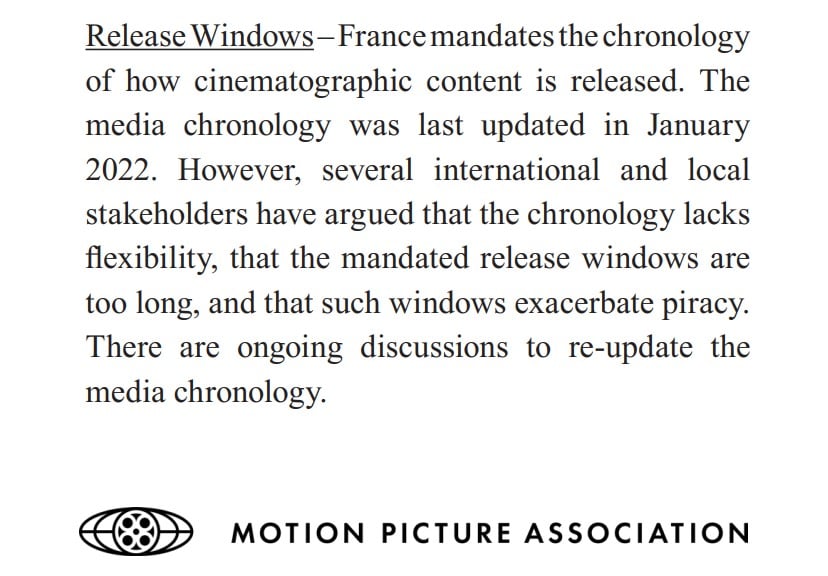Mandatory version of Windows may exacerbate piracy * TorrentFreak

house > Law and politics >
Over recent decades, theatrical film release windows have shrunk dramatically around the world. However, in France, movie fans still have to wait over a year before they can stream the latest blockbuster. The MPA identifies this mandatory release window as a potential trade barrier, with the potential to make piracy worse.
 Motion Picture Association (MPA) represents many of the largest film companies in the world.
Motion Picture Association (MPA) represents many of the largest film companies in the world.
Traditionally, its members were restricted to major Hollywood studios like Disney and Warner Bros., but three years ago streaming giant Netflix joined the exclusive club.
The newcomer has not changed the MPA’s main goal of protecting its members’ content from piracy. The MPA is the driving force behind the Alliance for Creativity and Entertainment that addresses copyright infringement globally on behalf of dozens of major rights holders, including Netflix.
foreign trade barriers
Aside from enforcement, the MPA is also heavily involved in lobbying efforts. This week I sent an overview of global copyright challenges to the United States Trade Representative (USTR), as an entry for the annual report on foreign trade barriers.
As usual, the comments detail piracy problems and challenges in countries around the world. They include concerns about a lack of anti-video recording legislation, weak anti-piracy enforcement, as well as general shortcomings in overseas copyright laws.
The general thrust of these comments is that “more” should be done to address the problem of piracy. However, when looking at this year’s report, we made an interesting observation, that sometimes less can be more.
French version windows
As reported a few months ago, France has a “media chronology” law that gives an exclusive release window to cinemas. This also applies to streaming services like Netflix, Amazon Prime, and Disney+.
The theatrical release window was cut back from three years to 15-17 months earlier this year. While this is a step in the right direction, streaming services would like to shrink the window even further.
According to the MPA, these windows could be seen as a trade barrier that, as suggested, could make piracy a bigger problem.
“The media chronology was last updated in January 2022. However, many international and domestic stakeholders have argued that the chronology lacks flexibility, that mandatory release windows are too long, and that such windows exacerbate piracy,” the MPA wrote.

sensitive issue
MPA stands for “stakeholder” and does not take a strong position per se. The window issue is very sensitive as many movie theater owners believe that shorter windows will hurt box office revenue.
When movie companies began experimenting with simulcasts and theatrical releases during the COVID pandemic, theater owners sounded the alarm. According to the movie theater industry group NATO, exclusive release periods are essential to the industry’s survival and success.
The MPA is more conservative and doesn’t believe the revenue streams are in competition. This could also explain why the group decided to highlight the issue in the Trade Barriers report.
Italy too
Interestingly, the debate does not end with France. Italy has also considered a mandatory 90-day release window for all theatrical films this year. This is also of concern to the MPA, although hacking is not directly mentioned there.
Instead, the Hollywood group is worried about the marketing issues these windows might pose.
“The MPA is concerned with the broader impact of such an extension, as this mandatory window would have serious ramifications for the ability of producers to appropriately market their work,” the film group notes.
The marketing problem can also have piracy ramifications of course. If the digital release of a movie is being widely promoted around the world, Italians may be more eager to pirate it if there are no legal options available to them.
All in all, the MPA edit window’s comments, however small, are noteworthy. For decades, consumers have demanded shorter windows and many stakeholders in the film industry now appear to be in the same camp.
–
A full overview of the MPA’s Trade Barrier Comments to the US Trade Representative is available here (pdf).
